MercoPress. South Atlantic News Agency
Tag: Alvaro Uribe
-
Friday, July 16th 2021 - 09:40 UTC
Colombian court hears new charges against Army staff allegedly involved in human rights violations
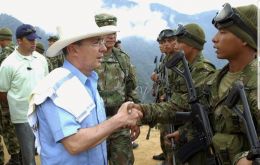
Colombia's Special Jurisdiction for Peace (JEP) has filed charges Thursday against 15 members of the national army of “war crimes and crimes against humanity,” it was announced.
-
Saturday, May 1st 2021 - 09:50 UTC
Former President Uribe calls on police and army to use weapons in Colombian protests

Colombian former President Álvaro Uribe on Friday urged that police and military have the right to use arms in the context of demonstrations against the tax reform being promoted by the government of Ivan Duque, his political godson. The following reactions included Human Rights groups and political figures pressing Twitter to suspend Uribe’s account, where he posted the message.
-
Tuesday, October 13th 2020 - 08:44 UTC
Colombia ex president Uribe released from house arrest while probe on witness tampering continues
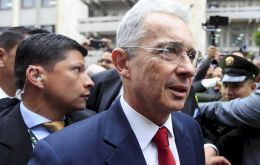
A Colombian judge on Saturday ordered an end to house arrest for former president Alvaro Uribe, who is under investigation for alleged witness tampering and fraud.
-
Thursday, August 20th 2020 - 10:51 UTC
Ex Colombian president Uribe, under investigation, resigned his Senate seat

Former Colombian President Alvaro Uribe, who is under investigation for alleged witness tampering, resigned his Senate seat on Tuesday after being placed under house arrest earlier this month.
-
Wednesday, August 8th 2018 - 06:50 UTC
Colombian president Duque anticipates “corrections” to the peace deal with guerrillas
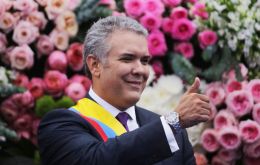
Colombia’s youngest elected president was sworn in to office on Tuesday, promising to “make corrections” to a peace deal with leftist rebels that has divided the country and to crack down on lingering armed groups still roaming the countryside.
-
Friday, August 3rd 2018 - 09:38 UTC
Colombia's kingmaker withdraws his Senate resignation letter
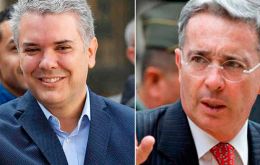
Former Colombian President Alvaro Uribe, accused of witness tampering and bribery, asked the Senate to ignore his resignation letter so that his case remains with the Supreme Court. Uribe, who was in office from 2002 to 2010 and mounted a military offensive against Marxist guerrillas, said on Monday he would resign his seat in the Senate to concentrate on his defense after the Supreme Court called on him to testify.
-
Monday, June 18th 2018 - 07:20 UTC
President elect Duque pledges to unite Colombia and change the peace accord with FARC
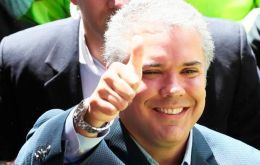
Colombia's President-elect Ivan Duque, who swept aside leftist Gustavo Petro in Sunday's election, pledged to unite the nation after a divisive campaign but insisted he would change a landmark peace accord with leftist rebels
-
Wednesday, June 13th 2018 - 08:30 UTC
Opinion polls confirm Duque as winner in Colombia's presidential runoff

Right wing candidate Ivan Duque looks set to win Colombia’s presidential run-off on June 17, two polls published on Friday indicated, as he held on to his long-running lead over leftist Gustavo Petro.
-
Saturday, May 26th 2018 - 09:15 UTC
Colombia's presidential election: another referendum on the peace deal?
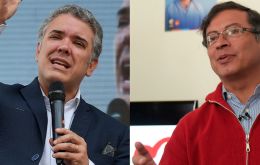
On Sunday, Colombians will head to the polls to elect a new president. At play in this year’s election are a range of issues: Venezuelan migration, economic situation, rampant corruption, high levels of inequality, but above all is the country's historic peace accord that ended over half a century of armed conflict.
-
Monday, March 12th 2018 - 09:08 UTC
Uribe protegé Duque, and ex Bogotá mayor dominate Colombia's legislative elections
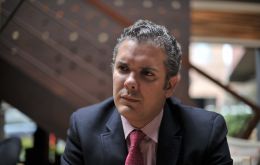
Right-wing candidate Ivan Duque and leftist Gustavo Petro will lead their respective coalitions in Colombia’s May presidential election after winning primaries on Sunday. Duque, a protégé of former President Alvaro Uribe and the standard bearer for the Democratic Center party, beat fellow candidates Marta Lucia Ramirez and Alejandro Ordonez for his coalition’s nomination. He got more than 3.9 million votes and 96% of the votes counted.
